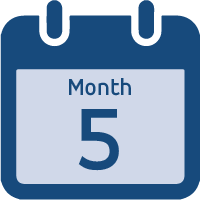Welcome to Month Five as a New Employee!
This Month | Learning Content | Questions | Onboarding Series Home
 This Month: Effective Communication
This Month: Effective Communication
Communication is a foundational skill that can improve all areas of job performance—and it’s particularly important when collaborating with others. We encourage you to continue to develop your communication skills by incorporating these tips next time you have a meeting or conversation:
- Prepare. Be sure you know what your goal is. Whether you want to inform, get feedback or receive approval, prepare an agenda that supports your goal.
- Clarify your goal and the agenda to make sure everyone is on the same page. It’s useful to get agreement on goals and the agenda to get buy-in.
- Encourage participation and ensure no one dominates the conversation.
- Summarize any conclusions out loud to confirm you are drawing the correct conclusions. Then, end the meeting by summarizing the progress that has been made and outlining any agreed-upon action steps.
- Follow up after the meeting with a written summary of what was decided and communicate any action steps.
Our system transforms lives by collaborating to achieve mutual success.
Another way to enhance your learning and growth is to learn from others. We encourage you to set up some time with your supervisor’s supervisor or another leader to discuss your new role and/or learn more about a role to which you may aspire. Refer to the Learning through Informational Interviewing resource for tips on how to plan for and conduct this meeting.
You are supported, valued and empowered.
Your personal health and wellness matter. Check out the many wellness resources available to you, as well as perks and discounts on things like gym memberships and cellular services.
Learn, discover and innovate each day.
Log into Percipio with your normal university ID and password, and take advantage of these resources to enhance your communication and facilitation skills.
- Three Communication Building Blocks (2 minutes)
- Planning Meetings Fit for Purpose (16 minutes)
You work in a safe, inclusive, transparent environment.
A bias is a shortcut our mind takes that allows us to categorize and assess information quickly. Biases provide a generalized idea about what something or someone is like—and the bias process is natural. We all have these biases. Sometimes, though, biases lie below our level of awareness. It’s important to be aware of our biases so they do not cause us to make faulty assumptions that can get in the way of making good decisions about hiring, collaborating, promoting and more. To learn more about your implicit biases, take the (anonymous) Implicit Association Test.
Questions?
If you have any questions, contact us at learningdevelopment@umsystem.edu.
Reviewed 2021-07-01
